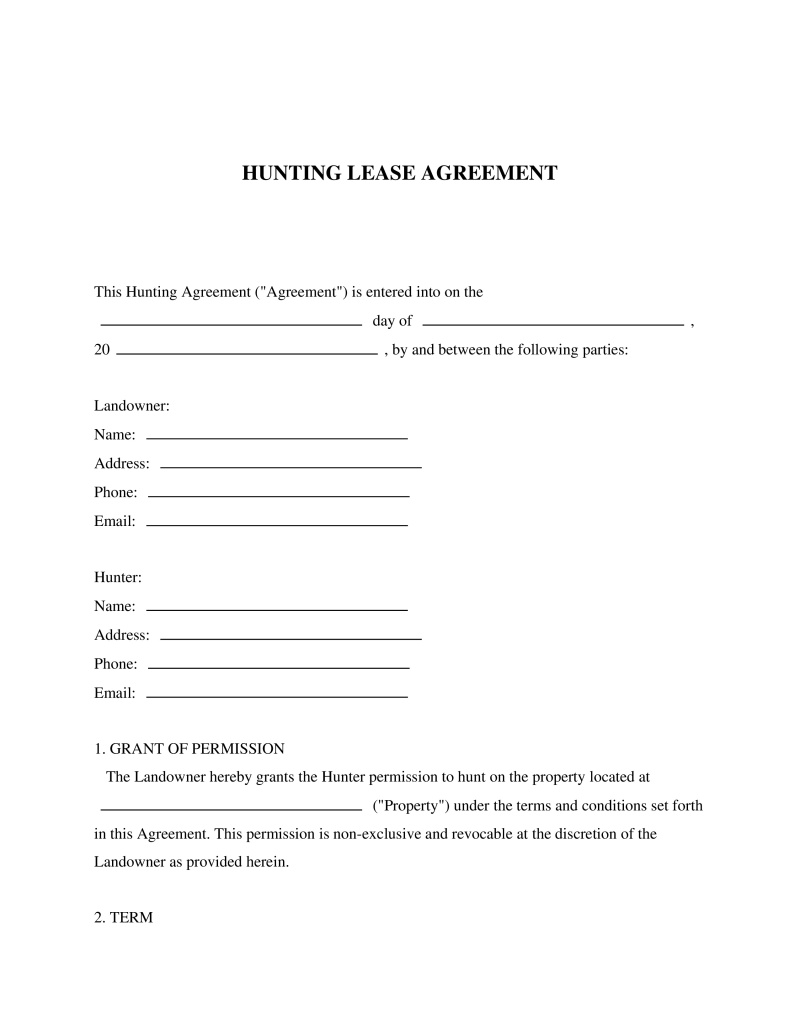A Hunting Lease Agreement is a legal document that outlines terms for hunting on private land.
Landowner Name
Write the full legal name of the landowner, which could be an individual or a business entity. Make sure to include any middle names or initials if applicable, and avoid using nicknames. Providing the correct name is important because it ensures the legal document accurately reflects ownership and rights related to the property.

Table of Contents
What is a Hunting Lease Agreement?
A Hunting Lease Agreement is a legally binding document between a landowner and one or more individuals (lessees) who wish to obtain temporary rights to hunt wildlife on the property. This document specifies terms including the duration of the lease, the types of game that may be hunted, and any restrictions or conditions set by the landowner. It serves as a crucial tool for landowners to manage hunting activities on their property while providing hunters with clear guidelines and access rights. Individuals or groups looking to secure hunting grounds for a season, as well as landowners aiming to generate income from their land while maintaining control over its use, will find this agreement indispensable.
Key Features
Important Provisions
- Payment Terms: Details on whether leases are paid monthly or based on acreage, including any security deposit requirements.
- Hunting Rights: Specifies what types of game may be hunted, methods allowed, and any restrictions imposed by seasons or wildlife conservation laws.
- Liability Waiver: A clause releasing the landowner from liability for injuries sustained by lessees while on the property, often requiring lessees to carry personal insurance.
- Property Use Restrictions: Limits certain activities such as building permanent structures or altering the landscape without permission.
Pros and Cons
Pros
- +Using this Hunting Lease Agreement helps prevent misunderstandings by clarifying rules and expectations upfront.
- +It potentially offers a steady income stream for landowners with underutilized property.
- +For hunters, it provides legal access to private lands that might otherwise be unavailable for hunting activities.
- +The agreement can be tailored to fit various durations, from a single season to multiple years, offering flexibility for both parties.
- +Including detailed descriptions of permissible activities helps protect natural resources and ensure sustainable hunting practices.
Cons
- -Negotiating terms that satisfy both parties may require considerable time and effort.
- -The cost of a hunting lease per acre can vary widely, making it difficult for lessees to find affordable options.
- -Landowners assume a level of risk in allowing outsiders onto their property, even with stringent clauses.
Common Uses
- Leasing private woodlands for deer or turkey hunting seasons.
- Securing access to prime duck hunting territories on wetlands owned by another party.
- Groups or clubs leasing large tracts of land for exclusive hunting rights.
- Farmers generating additional income by leasing out cropland borders during off-seasons for hunting purposes.
- Ranchers offering big game hunts on extensive private ranch lands.
Frequently Asked Questions
Do you have a question about a Hunting Lease Agreement?
Example questions:
Not the form you're looking for?
Try our legal document generator to create a custom document
Community Discussion
Share your experience and help others
Legal Notice: Comments are personal opinions and do not constitute legal advice. Always consult a qualified attorney for matters specific to your situation.
Comments (0)
Leave a Comment
No comments yet. Be the first to comment!